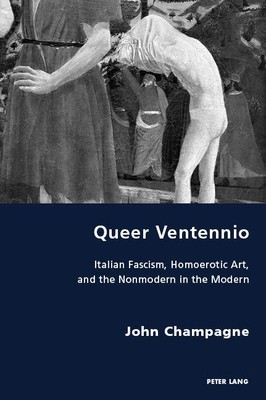
- We will send in 10–14 business days.
- Publisher: Peter Lang Ltd, International Academic Publishers
- ISBN-10: 1789972248
- ISBN-13: 9781789972245
- Format: 15 x 22.6 x 1.8 cm, softcover
- Language: English
- SAVE -10% with code: EXTRA
Queer Ventennio (e-book) (used book) | bookbook.eu
Reviews
Description
Given fascist proscriptions against homosexuality, a surprising number of artists under Mussolini's regime were queer. Exploring the contribution of Italy to our understanding of both the history of homosexuality and European modernism, this ground-breaking study analyses three queer modernists - writer Giovanni Comisso, painter and writer Filippo de Pisis, and painter Corrado Cagli. None self-identified as fascists; none, however, were consistent critics of the regime. All understood their own sexuality via the idea of the primitive - a discourse fascism also employed in its efforts to secure consent for the dictatorship. What happens when we return to these men and their work minus the assumption that our most urgent task is identifying their fascist tendencies or political quietism? Variously infantilized, pathologized, marginalized, and stigmatized, treated as both cause and effect of fascism, queer ventennio artists are an easy target, not brave or selfless or savvy enough to see their common struggle with fascism's other victims. Revisiting their works and lives with an eye toward neither rehabilitation nor condemnation allows us to ponder more carefully the relationship between art and politics, how homophobia has structured art criticism, the need to further bring queer perspectives to Italian cultural analysis, and how such men disrupt our sense of modern homo/heterosexual definition.
EXTRA 10 % discount with code: EXTRA
The promotion ends in 18d.18:58:04
The discount code is valid when purchasing from 10 €. Discounts do not stack.
- Publisher: Peter Lang Ltd, International Academic Publishers
- ISBN-10: 1789972248
- ISBN-13: 9781789972245
- Format: 15 x 22.6 x 1.8 cm, softcover
- Language: English English
Given fascist proscriptions against homosexuality, a surprising number of artists under Mussolini's regime were queer. Exploring the contribution of Italy to our understanding of both the history of homosexuality and European modernism, this ground-breaking study analyses three queer modernists - writer Giovanni Comisso, painter and writer Filippo de Pisis, and painter Corrado Cagli. None self-identified as fascists; none, however, were consistent critics of the regime. All understood their own sexuality via the idea of the primitive - a discourse fascism also employed in its efforts to secure consent for the dictatorship. What happens when we return to these men and their work minus the assumption that our most urgent task is identifying their fascist tendencies or political quietism? Variously infantilized, pathologized, marginalized, and stigmatized, treated as both cause and effect of fascism, queer ventennio artists are an easy target, not brave or selfless or savvy enough to see their common struggle with fascism's other victims. Revisiting their works and lives with an eye toward neither rehabilitation nor condemnation allows us to ponder more carefully the relationship between art and politics, how homophobia has structured art criticism, the need to further bring queer perspectives to Italian cultural analysis, and how such men disrupt our sense of modern homo/heterosexual definition.


Reviews